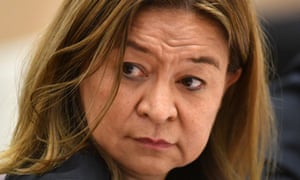The ABC’s managing director, Michelle Guthrie, has told Senate estimates she believes it is not her job to lobby government for more funding for the broadcaster but to work within the budget she is given.
Under questioning at a fiery Senate estimates committee, Guthrie revealed she saw her role as a manager rather than an advocate for more funding, a marked difference from her predecessor Mark Scott who was a consistent lobbyist for additional funding and critic of government cuts.
“On my second day in the job I was handed down the triennial funding in the May budget and as far as I’m concerned we operate within that three-year funding envelope,” Guthrie said.
Asked repeatedly if she believed it was her role to seek more funding to fulfil the ABC’s charter she said no because her focus was on providing content and operating efficiently.
“We have had budget cuts since 2014 but my view is we operate within the funding envelope we are provided and we make decisions within that as an independent broadcaster.
She also refused to concede that anyone other than the 15 people who called the ABC to complain, or the 51 who gave submissions to a Senate committee, had been affected by the decision to scrap the shortwave radio service.
She appeared before a Senate estimates committee on Tuesday, answering questions about the decision to end the broadcasting of local radio through shortwave channels in the Northern Territory and Pacific region. The decision was been widely criticised, including by all major parties.
Guthrie was unable to provide evidence of prior consultation on the decision and claimed the ABC was not the official emergency broadcaster.
Asked by Greens senator Scott Ludlam about the “extraordinary cuts” to Radio National features, religion and music, Guthrie dismissed his premise, saying: “I wouldn’t characterise taking three music programs away from RN as an extraordinary decision.”
The vote of no confidence in RN management was “not something we would desire but did not represent all the views of the staff at Radio National”, Guthrie told Ludlam.
Guthrie defended the hiring of former Rupert Murdoch TV executive Jim Rudder and “business transformation expert” Deb Frances to help restructure the ABC.
“I am confident that our executive management have the skills and experience required to navigate the ABC through the challenges ahead but I am also aware that it is sensible to consult with people outside the organisation that have relevant experience,” she said.
She confirmed that a restructure would be announced in the next week or so and that she had the support of the board.
“The board is very supportive of the changes that need to be made as we experience audience shifts and digital disruption,” she said. She declined to confirm there would be cuts to staff.
Guthrie took many questions on notice and referred to her notes to answer the details of many of the questions, at one point saying she had only been in the job for 10 months.
She said the ABC had been contacted by fewer than 15 people, including just six from the Northern Territory, over the cuts to shortwave radio.
“It isn’t in our interest at all to cut off any person from our services,” she said. “But frankly the low number of complaints from listeners highlights previous research which shows that shortwave is used by very few people as their primary means for listening to radio.”
Guthrie returned to the 15 official complaints repeatedly during the estimates hearing.
Nationals senator Bridget McKenzie and Labor senator Malarndirri McCarthy pointed to criticism by a number of stakeholder groups, including the NT Cattlemen’s Association, fishing associations, remote Indigenous organisations and the NT government.
Guthrie said she had not received a letter from the Cattlemen’s Association. McCarthy questioned why Guthrie was discounting a letter from herself and fellow parliamentarian Warren Snowdon, which outlined the peak body’s concerns.
Guthrie was also asked to provide the research which led to the board’s decision, and evidence of prior consultation. She said the ABC hadn’t consulted with the community until after the announcement, but had spoken to stakeholders before it. She was unable to name any of the stakeholders, and took all requests for research or evidence on notice.
The committee chair, senator Linda Reynolds, revealed a committee inquiry set up to examine the decision had received 52 submissions about the shortwave cut, and only one – the ABC’s – was in support.
At the end of an hour of questioning Reynolds said she hoped the ABC would take the issue more seriously and was disappointed in the lack of answers from Guthrie. Guthrie said the ABC did take it seriously.
“I agree that it’s terrible when 15 people are affected, or 52 people are affected, but I will say that we’d love to hear from them directly and find ways in which we can work with them to actually transition those services,” she said.
Reynolds responded: “If that’s what you have taken out of what the senators and submissions have said to you – that it’s only 15 people or 52 submitters which is the extent of people affected by that – I think we are going to have some very interesting discussions in the next hearing.”
In response to concerns raised that people without shortwave would lose the emergency broadcasts during floods, fires, and cyclones, Guthrie said the ABC was not the emergency broadcaster in the NT.
A spokesman for the ABC later clarified Guthrie was referring specifically to ABC shortwave as an emergency service provider.
Guthrie said the ABC’s priority “has to be the efficient management of our total ABC budget” and it was clear the continued provision of shortwave was “not in the best interest of the efficient operation of the ABC budget”.
Asked directly if she would reverse the decision, Guthrie said no.

No comments:
Post a Comment